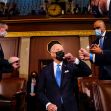President Biden signed two executive orders (EO) this month to rebuild and fix America’s gravely broken immigration system. He hopes to replace images of children in cages and crying refugees with policies that reflect our national values and our place in the world as a “beacon of hope, a promoter of stability, and a facilitator of international collaboration.”
The EOs consistently call for improving the quality, integrity, efficiency, and fairness of the immigration process. It builds on the Biden-Harris Family Reunification Task Force created on January 20 and its efforts to create a viable pathway to citizenship for some “11 million undocumented immigrants living in and contributing to our country.” And it changes their description from “aliens” to “non-citizens.”
A White House Fact Sheet states, “The Trump Administration’s policies at the border have caused chaos, cruelty and confusion. Those policies have undermined the safety of our communities, penalized asylum seekers fleeing violence, and destabilized security across the Western hemisphere.” It emphasizes plans to roll back “the most damaging policies adopted by the prior administration, while taking effective action to manage migration across the region.”
The Fact Sheet summarizes a three-part plan that the February 2nd EOs put into effect. First, it will address the underlying causes of migration by discovering and rectifying its underlying causes. Second, it will collaborate with a wide variety of international and domestic partners to protect asylum seekers. And third, it will assure that Central American refugees and asylum seekers have access to legal pathways to the U.S. EOs can reform federal agencies, but Congressional action is required to pass or change laws.
On February 18, Congressional Democrats in both the House and Senate took action on Biden’s plan by offering their own eight-year path to citizenship. Titled the “U.S. Citizenship Act,” it was introduced by Senator Bob Menendez (D-NJ) and Representative Linda T. Sánchez (D-NY). They wrote, “Today, we have an administration and a president that understands that the success of our country is interwoven and linked to the success of our immigrant communities, and it is time that we finally put in place an immigration system that’s based on that reality. Immigrants are good for our communities, for our economy and for our country.”
Biden’s EOs ask several federal agencies to “review of a host of Trump Administration proclamations, rules, and guidance documents that have effectively closed the U.S. border to asylum seekers.”
His first order, “Rebuilding and Enhancing Programs to Resettle Refugees and Planning for the Impact of Climate Change on Migration,” issued on February 2, will use the United States Refugee Admissions Program (USRAP), in cooperation with private partners and our nation’s communities, to carry out the humanitarian purposes of the Refugee Act of 1980.
It orders USRAP to be rebuilt and expanded in order to expedite the vetting of immigrants. In doing so, the order stresses that fairness, efficiency and improved methods of fraud detection should be implemented in a manner that also protects national security. A National Security Council Senior Director along with similar positions at the Departments of State, Homeland Security and the Office of Management and Budget, will work together to accomplish these tasks. It pays special attention to processing the unacceptable number of USRAP backlogs and asks a number of agencies to coordinate efforts to create a workable plan within 120 days.
The order singles out the Special Immigrant Visa (SIV) program for innovation because of the “faithful service that nationals from those countries provided to our country and our troops who are stationed there.” Biden asked the Secretary of State to conduct a comprehensive review of the SIV program and to make recommendations within 180 days, including an evaluation of whether legislation should be proposed “that would create a SIV program for individuals, regardless of nationality, who faithfully assisted the United States Government in conflict areas… or made exceptional contributions…and have experienced or are experiencing an ongoing serious threat as a result of their service.”
Other staffing improvements may include the National Vetting Governance Board, which is directed to review agency procedures to determine if staffing levels should change in order to “improve security reviews and make refugee arrivals more efficient.”
Biden’s order consistently sees immigrants as deserving of dignity and respect and forbids “improper discrimination on the basis of race, religion, national origin or other grounds.” It also demands transparency and accountability. He places special attention on those vulnerable to persecution, namely women, children and those who may be at risk of discrimination due to gender, gender expression or sexual orientation.” Employee training to enforce these policies is also required.
Innovative technology, private sponsorship, and community partnerships will be necessary to meet the challenges of comprehensive immigration reform. One example of technological improvements will be the creation of infrastructure that will facilitate video and audio teleconferencing to conduct refugees’ interviews. The order also calls for the development of improved ways to monitor the current conditions in countries from which hopeful immigrants are coming. Applicants may have access to their records, may have representatives present during interviews at no cost to the United States, and will be given explanations if their immigration permits are denied.
The EO also calls for plans to advance community and refugee settlement sponsorships and the development of new public-private partnerships within 120 days. Finally, this order asks for a report on how climate change is impacting migration.
Biden’s second executive order issued the same day is “On Restoring Faith in Our Legal Immigration Systems and Strengthening Integration and Inclusion Efforts for New Americans.” This companion piece praises the “over 40 million foreign-born individuals” who have made incalculable contributions to our national economy as essential workers in every public and private business and industry. He praises their contributions and wants our national policies to celebrate their emerging citizenship instead of instilling fear and creating barriers. As a result, he calls for “welcoming strategies that promote integration, inclusion and citizenship and it “should embrace the full participation of the newest Americans in our democracy.”
To accomplish this, the President designates the White House Domestic Policy Council to head up a new “Task Force on New Americans,” which will coordinate all efforts, including those of state and local governments, to welcome and support new immigrants. It is directed to identify any barriers or agency actions that are impeding progress toward the administration’s new goals. All actions must reduce processing times, make naturalization more accessible, and review policies affecting denaturalization and passport revocation and develop a national plan to promote naturalization.
Since taking office, the new Administration has already taken steps to reunite families, protect Dreamers (those with temporary protected status), end the Muslim and African ban, and halt construction of the Mexican border wall. He quickly revoked President Trump’s EO that separated children from their parents.
The White House Fact Sheet concludes, “The situation at the border will not transform overnight, due in large part to the damage done over the last four years. But the President is committed to an approach that keeps our country safe, strong, and prosperous and that also aligns with our values.”
Speaker of the House Nancy Pelosi said, "I salute the president for putting forth the legislation that he did. There are others who want to do piecemeal and that may be a good approach today. That’s up for the Congress to decide."
Menendez acknowledged to the New York Times that it will be difficult to win the support of ten Republicans who are needed to pass the bill. Politico agrees, noting “it already faces dim prospects.”






